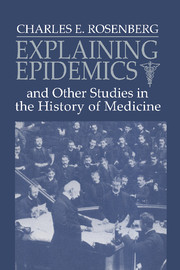Book contents
- Frontmatter
- Contents
- Acknowledgments
- Introduction: Why care about the history of medicine?
- I Ideas as actors
- 1 The therapeutic revolution: Medicine, meaning, and social change in nineteenth-century America
- 2 Medical text and social context: Explaining William Buchan's Domestic Medicine
- 3 John Gunn: Everyman's physician
- 4 Body and mind in nineteenth-century medicine: Some clinical origins of the neurosis construct
- 5 Florence Nightingale on contagion: The hospital as moral universe
- 6 Cholera in nineteenth-century Europe: A tool for social and economic analysis
- II Institutions and medical care
- III The past in the present: Using medical history
- Index
6 - Cholera in nineteenth-century Europe: A tool for social and economic analysis
Published online by Cambridge University Press: 29 March 2010
- Frontmatter
- Contents
- Acknowledgments
- Introduction: Why care about the history of medicine?
- I Ideas as actors
- 1 The therapeutic revolution: Medicine, meaning, and social change in nineteenth-century America
- 2 Medical text and social context: Explaining William Buchan's Domestic Medicine
- 3 John Gunn: Everyman's physician
- 4 Body and mind in nineteenth-century medicine: Some clinical origins of the neurosis construct
- 5 Florence Nightingale on contagion: The hospital as moral universe
- 6 Cholera in nineteenth-century Europe: A tool for social and economic analysis
- II Institutions and medical care
- III The past in the present: Using medical history
- Index
Summary
This paper was written for an occasion and with an agenda reflecting disciplinary politics. It was solicited for a session on health and economic development at an international meeting of economic historians held in August of 1965. Designed to attract the interest of economists, my argument underlined the importance of soft – intellectual and cultural – variables in understanding economic growth and change. Cholera, I contended, was not significant in demographic terms, but could be seen as a sampling device, a way of gaining access to particular configurations of demographic and economic circumstances, ideas, and institutional relationships illuminated in the course of the nineteenth century's successive cholera pandemics.
Written in the mid-sixties, this essay will seem dated in some ways. Perhaps most conspicuous is the way in which economic growth models seemed at the time the most plausible context in which to “sell” the intellectual and social history of medicine to an audience of economic historians and economists. Development economics, with its formal discussion of the stages and necessary preconditions of growth, its implicit evolutionary and teleological structure, has come to seem dated, ethnocentric, and arbitrary. A generation marked by relativism, antiauthoritarianism, anticolonialism, and ecological sensitivity – not to mention the accumulation of a great deal of intractable data – has made us a great deal more tentative in discussing the nature and consequences of economic growth.
- Type
- Chapter
- Information
- Explaining Epidemics , pp. 109 - 122Publisher: Cambridge University PressPrint publication year: 1992



